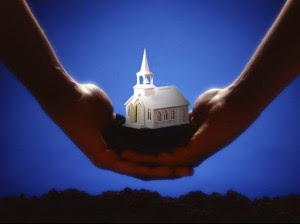Retool. Refocus. Rethink.
This is the saddest picture I could imagine for a church,
but it’s not the first time God’s people felt this way. Have you ever read Isaiah? These fifth century Judeans return home from exile
. . . back to their homeland . . . back to where they used to worship . . . but
it’s to a city that’s utterly destroyed.
Babylon burned everything decades ago. Sacred spaces lie in
ruins. The crops withered. The Temple reduced to gravel. Everything is but a shadow of what it used to
be.
And the one’s left to rebuild all of this aren’t even the
ones who saw it destroyed. They were
born into this mess. The ones who knew
of Judah’s former glory were either killed in battle or died in exile.
Judah’s considerably smaller, poorer . . . more in debt . . . suffering from plagues, famines, disease, despair, crop failures, old age yet left to rebuild a burned down city wasting all their energy and time for what appears to be for no reason. Whatever joy there may have been in the anticipation of returning has now disappeared. It’s a sad story really. If you read the later chapters of Isaiah you even begin to hear the Judean’s collective consciousness, “We’re dying. And we don’t have much more to offer God.”
Judah’s considerably smaller, poorer . . . more in debt . . . suffering from plagues, famines, disease, despair, crop failures, old age yet left to rebuild a burned down city wasting all their energy and time for what appears to be for no reason. Whatever joy there may have been in the anticipation of returning has now disappeared. It’s a sad story really. If you read the later chapters of Isaiah you even begin to hear the Judean’s collective consciousness, “We’re dying. And we don’t have much more to offer God.”
We are eerily similar to these post-exiled Judeans.
We look at the work it’s going to take to rebuild our churches
to their former glory and we’re met with anguish, difficult times, and
frustration. We look at the work it’s
going to take to become a necessary influence on the community and we drown in
despair.
So we just tell stories . . . but these stories are of how it
used to not be this way. We retreat inward knowing it’s too painful to think about what we’re not. We just relive the memories of what we used
to be. And, honestly, we find ourselves
asking, “What’s the point? Why should we
even bother?”
We should “bother” because the Spirit of the Lord is upon
us . . . bearing God’s message.
God’s Church isn’t dying.
We’re on the cusp of thriving. As
Eugene Lowry says, “We’re dancing the edge of mystery.” So it’s for this reason we must gather together. Rethink who we are. Retool what we have. And Rethink who we can be. We must change our collective
consciousness.
The future for the Church lies in the hearts and souls of
each of us. As long as we are a people
who care passionately about social justice, who offer peace instead of war, who
give hope to a future that needs it, who educate, who practice authentic spirituality,
and who offer prayers for the brokenhearted then the church is forever
needed.
We can escape our own turmoil in our own exile . . . we
can realize we aren’t dying; we just have to start
listening to voice of the living God in each of us!




Comments